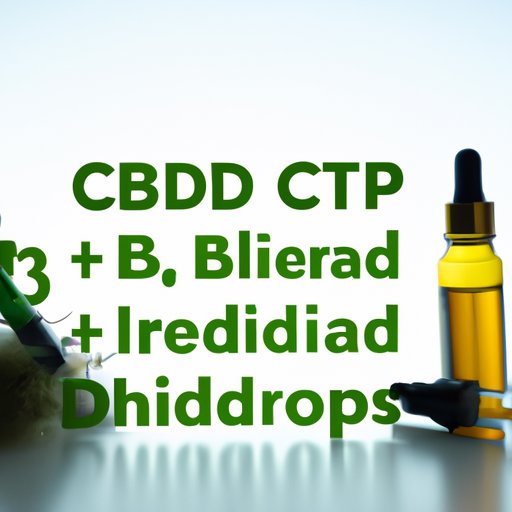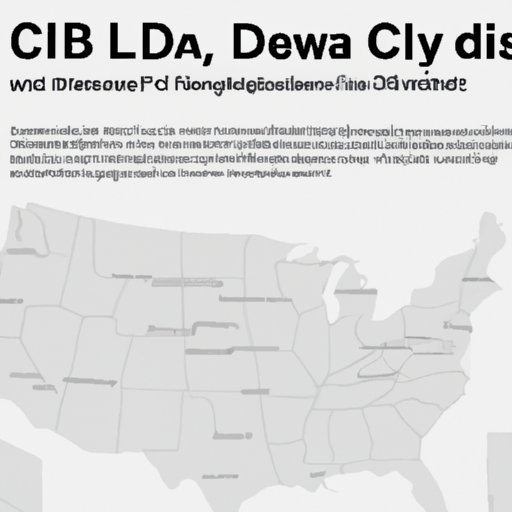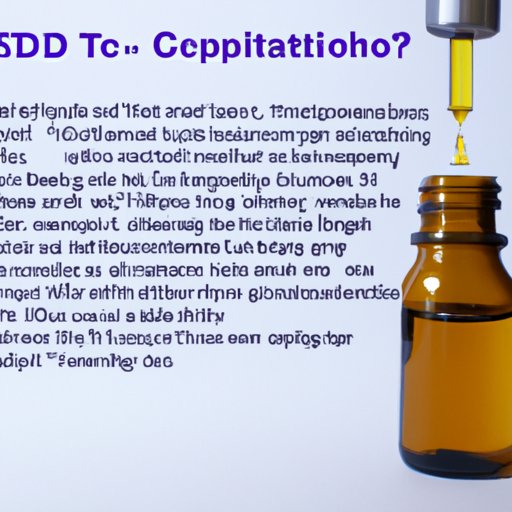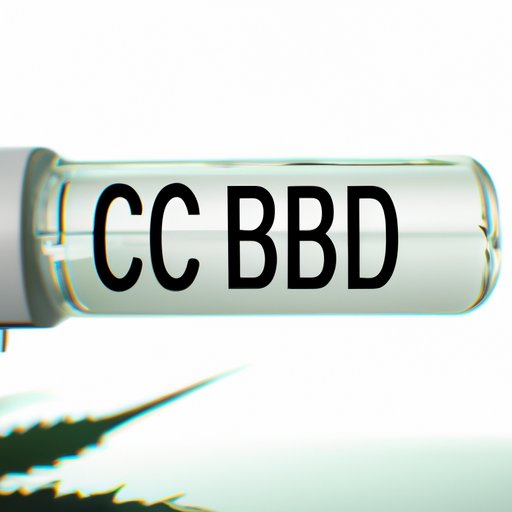I. Introduction
CBD, or cannabidiol, is a natural compound found in the cannabis plant that has gained widespread popularity in recent years for its alleged health benefits. While CBD is not psychoactive like its counterpart, THC, it has led to some confusion when it comes to drug testing. Many people are left wondering whether CBD use can cause them to fail a drug test and what the legal and ethical implications are of drug testing for CBD. In this article, we explore the issue of CBD causing drug test failure and its significance.
II. Understanding CBD and Drug Tests
Before diving into the risks and potential outcomes of CBD use and drug testing, it’s important to understand what CBD is and how it interacts with your body. CBD interacts with your endocannabinoid system, a network of receptors and molecules in your body that helps regulate many physiological processes such as mood, appetite, pain sensation, and sleep. Unlike THC, CBD does not bind to the same receptors that cause psychoactive effects like euphoria, making it non-intoxicating and safe to use.
When it comes to drug testing, there are a few different types of tests that employers or organizations may use. The most common type of drug test is a urine test, which can detect THC metabolites up to 30 days after ingestion. Blood tests, saliva tests, and hair tests are also used to detect THC or other drugs.
While drug tests are designed to detect the presence of THC, some tests may pick up on other trace cannabinoids present in CBD products. This can lead to false-positive results and can cause confusion for consumers who are unknowingly purchasing products that contain THC.

III. Types of CBD Products and Drug Test Risks
There are many different types of CBD products on the market, each with varying levels of THC content. Full-spectrum CBD products contain all of the cannabinoids present in the hemp plant, including THC. Broad-spectrum CBD products contain all of the cannabinoids except THC, while CBD isolate products contain only CBD and no other compounds.
While the risk of failing a drug test due to CBD use is low for most individuals, those who use full-spectrum CBD products or high-CBD strains of cannabis may be at higher risk for a positive test result. This is especially true for those who consume large amounts of CBD daily, as well as those who are sensitive to THC or metabolize it differently than others.

IV. Legal Gray Areas Surrounding CBD and Drug Testing
Despite the growing popularity of CBD and the legalization of hemp-derived CBD products at the federal level in the United States, there are still many legal gray areas surrounding CBD and drug testing. While it is legal to sell and consume hemp-derived CBD products that contain less than 0.3% THC, some employers and organizations still have strict drug testing policies that prohibit any THC use, including that which is found in legally purchased CBD products. This has led to confusion and frustration among consumers who are forced to choose between their health and their job security.
Furthermore, different states have different laws regarding the use and possession of cannabis products, which can create even more confusion for CBD users who travel frequently or work across state lines. Some states have implemented more lenient drug testing policies for CBD users, while others have remained steadfast in their zero-tolerance approach to THC use.

V. Ethical Implications of Drug Testing for CBD
The use of drug testing to detect THC and THC metabolites in the workplace can have a significant impact on both employees and employers. For employees, drug testing policies can lead to feelings of anxiety and distrust, as well as stigmatization and discrimination. For employers, drug testing policies may be costly to implement and may result in the loss of valuable employees who use CBD products for health reasons.
As more research emerges on the potential health benefits of CBD, it’s becoming increasingly clear that drug testing policies that prohibit THC use may no longer be necessary or reasonable. There is a growing movement among lawmakers, employers, and employees to reassess current drug testing policies and implement more fair and equitable practices that account for the changing landscape of CBD use.
VI. Case Study: The Personal Impact of CBD-Fueled Drug Test Failure
To illustrate the potential consequences of CBD use and drug testing, we spoke with Jane, a sales manager who recently failed a drug test due to her use of full-spectrum CBD oil. Jane had been using CBD as part of her daily wellness routine for the past year to help with anxiety and insomnia. She had no idea that the small amount of THC present in her CBD oil could lead to a positive drug test result.
When Jane’s employer informed her that she had failed the drug test, she was devastated. She had never used recreational drugs and felt like she had let her coworkers and boss down. Jane was placed on probation and forced to undergo drug counseling and testing for six months. She even considered quitting her job to avoid future drug tests, but ultimately decided to stick it out and hope for changes in company policy.
VII. Recent Changes in Drug Testing Policies for CBD Users
Despite the challenges faced by CBD users like Jane, there have been some recent changes in drug testing policies that aim to better accommodate CBD users. The Substance Abuse and Mental Health Services Administration (SAMHSA), which sets standards for workplace drug testing, recently raised the threshold level for THC metabolites in urine tests from 50 ng/mL to 150 ng/mL, making it less likely for someone using legally purchased CBD products to test positive for THC.
Many states have also implemented their own policies on drug testing and CBD use. For example, Maine and Nevada have both passed laws that prohibit employers from discriminating against employees or job applicants who use cannabis, including CBD, outside of work. As more states legalize cannabis for both medicinal and recreational purposes, it’s likely that more changes to drug testing policies will follow.
VIII. Mitigating the Risk of CBD-Related Drug Test Failure
For those who use CBD products and are concerned about the risk of failing a drug test, there are a few things that can be done to mitigate that risk. The easiest way to avoid a positive test result is to use CBD isolate products, which contain no THC. It’s also important to research the company that produces the CBD products you purchase to ensure that they have third-party lab testing for purity and potency.
For those who have tested positive for THC and believe it’s due to their use of legally purchased CBD products, it may be worth getting a second opinion on the test results. Some labs offer more advanced testing methods that can distinguish between THC and other cannabinoids, allowing for a more accurate result.
IX. Conclusion
While the issue of CBD and drug test failure is a complex and constantly evolving one, it’s clear that there is still much work to be done to ensure that CBD users are not unfairly discriminated against in the workplace. By understanding the risks and legal gray areas surrounding CBD use, as well as the ethical implications of drug testing policies, we can work toward a more just and equitable future for all.
